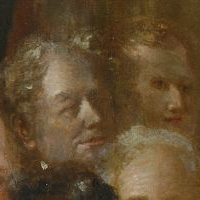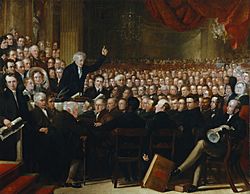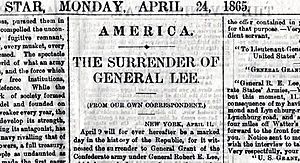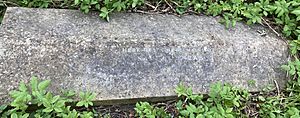Samuel Lucas facts for kids
Quick facts for kids
Samuel Lucas
|
|
|---|---|

Rev. Cox (left) and Samuel Lucas (right) shown in a detail from The Anti-Slavery Society Convention, 1840, by Benjamin Robert Haydon
|
|
| Born | 1811 Wandsworth, London, England
|
| Died | 16 April 1865 (aged 53–54) London, England
|
| Resting place | Highgate Cemetery |
| Nationality | British |
| Known for | Abolitionist, editor of the Morning Star |
Samuel Lucas (born 1811, died 16 April 1865) was a British journalist and a strong supporter of ending slavery. He was the editor of a London newspaper called the Morning Star. This newspaper was the only one in Britain that supported the Union (North) during the American Civil War. Samuel Lucas lived long enough to hear that slavery in America had finally ended.
Contents
Who Was Samuel Lucas?
Samuel Lucas was born in 1811 into a Quaker family in Wandsworth, London. Quakers are a religious group known for their peaceful beliefs and their work for social justice. His younger brother was Frederick Lucas. Samuel's father worked by buying and selling corn.
In 1839, Samuel Lucas married his cousin, Margaret Bright. She also came from a well-known Quaker family. Margaret later became famous for her own work, especially after Samuel's death.
Fighting for Important Causes
Samuel Lucas cared deeply about many important causes. In 1840, he went to the World Anti-Slavery Convention. This was a big meeting where people from all over the world gathered to talk about how to end slavery. He was even included in a famous painting about the event by Benjamin Haydon.

Ending slavery was a goal Samuel worked on throughout his life. He also supported the idea of "secular schools." These were schools that taught general subjects without focusing on one specific religion. He promoted these schools in Manchester, where he met Richard Cobden.
Lucas moved to Manchester in 1845 to work with a cotton mill. He stayed there for five years before moving back to London. He became very active in the Anti-Corn Law League. This group, started by Cobden and John Bright, worked to lower the price of food for ordinary people. Samuel's wife, Margaret, helped organize meetings, and Samuel often led them.
In 1847, Samuel Lucas helped start an organization in Lancashire that later became the National Public Schools Association. He wrote a plan for a system of secular education in the county. By 1860, Lucas and his family were living in London. There, he supported the Society for the Repeal of the Taxes on Knowledge. This group wanted to remove taxes on newspapers and books, making them cheaper and easier for everyone to access.
Editor of the Morning Star
In March 1856, Samuel's brother-in-law, John Bright, and Richard Cobden started a new newspaper called the Morning Star. Samuel Lucas was chosen to be its editor. He was very involved in running the paper and was also its "managing proprietor," meaning he helped manage the business side.
The Morning Star took a very strong stand against slavery. It was the only national newspaper in Britain that supported the Union (the North) during the American Civil War. This was a very important position at the time.
Later, Samuel became too ill to go to the office regularly. He had to hire a sub-editor to help him. However, he still oversaw the paper. Sometimes, he would even make journalists write a second article if he didn't agree with their first one!
In 1859, Lucas also became the editor of a new weekly magazine called Once A Week. This magazine was known for its many illustrations. It stopped being printed in 1880, some years after Lucas's death.
His Final Days
Samuel Lucas passed away in London on 15 April 1865, due to a lung illness. It was noted that he lived just long enough to hear the news that the Battle of Richmond had ended. This battle marked the end of the American Civil War and, with it, the end of slavery in the United States.
He was buried in Highgate Cemetery in London. His wife, Margaret, was also buried there after she died in 1890.
Samuel Lucas's Legacy
Samuel Lucas died just before he could see the headlines in the Morning Star announcing the official end of slavery. His newspaper was unique because it supported the Union side from the very beginning of the war.
In 2010, an official from the U.S. Embassy visited Samuel Lucas's tomb to pay their respects. The inscription on his tomb reads:
Here rest the remains of SAMUEL LUCAS, aged 54. He died on 16 April 1865, a few hours after hearing the tidings of the destruction of the slave power in the United States, by the fall of Richmond; an object which he had unceasingly laboured to promote as Managing-Proprietor of the Morning Star.
The tomb of Samuel Lucas and his wife in Highgate Cemetery has been recognized as a Grade II listed building since 2007. This means it is an important historical structure.
 | Leon Lynch |
 | Milton P. Webster |
 | Ferdinand Smith |



